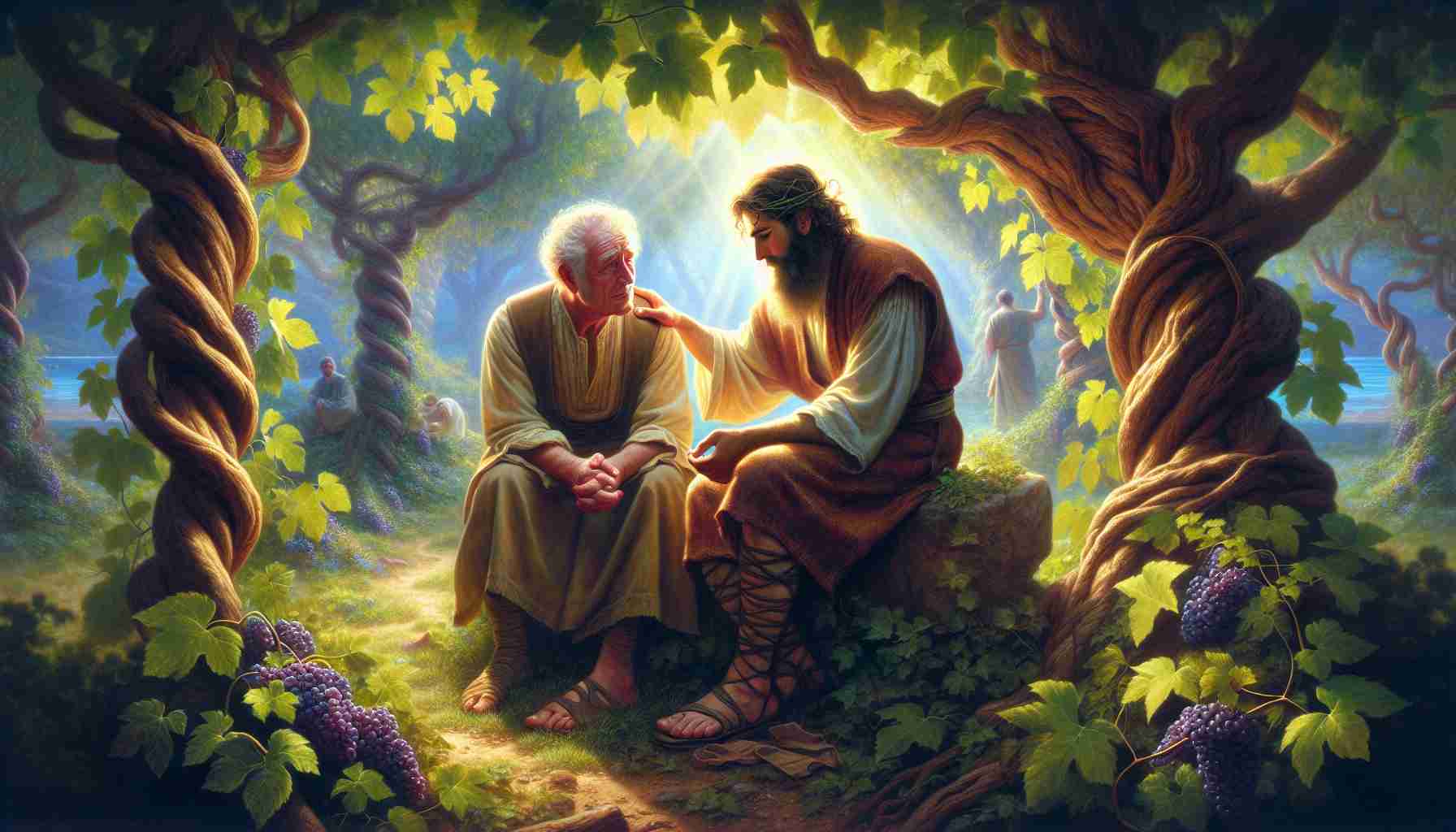

The vineyard walls groaned under Galilean sun. Dust clung to Judah's sandals as he stumbled through the stone path, avoiding the looks of villagers who once greeted him with honor. The air smelled of crushed grapes and shame—his father’s vineyard, once filled with laughter and workers, now sat silent. Roman taxes had bled them dry, but it was Judah's failure to tend the vines after his father’s illness that truly broke it. Each withering branch felt like a judgment.
He had tried so hard. He followed the instructions. He inspected the soil, mimicked what his father once did. But he could not coax life. Not from the vines. Not from himself. What remained were twisted stems and the ache of being hollow.
Word had spread that Jesus the teacher was coming through the village—staying with Simon the potter just up the hill. Judah had heard the name. He had seen people change when they spoke of Him—like they believed in morning again. He didn’t. Not really. But his feet led him there anyway, like branches drawn by something deeper than surface soil.
He arrived late. The courtyard was already crowded, shadows of lamplight flickering over heads craned to listen. Judah stayed near the wall, half-hiding behind the grapevine that crept across the clay arch over the doorway. Jesus sat in the center, quiet. Then He spoke—not loudly, not to impress—but in a way that pulled something from Judah’s chest.
“I am the true vine,” Jesus said, fingertips grazing a low-hanging branch. “And My Father is the gardener. Every branch in Me that doesn’t bear fruit, He removes… but every branch that does bear fruit, He prunes, so it will be even more fruitful.”
Judah’s breath caught in his throat. He remembered dried leaves slipping through his fingers. Had he been cut off? Had he already been deemed worthless?
Jesus’ eyes lifted, steady and searching. “Remain in Me, as I also remain in you. No branch can bear fruit by itself; it must remain in the vine.”
Judah felt exposed. The ache, the guilt—all the pretending—he had tried to revive a vineyard by his own strength, as if fruit came from striving. As if belonging had to be earned.
Jesus was looking directly at him now. It wasn’t accusation in His gaze. It was invitation.
“I have told you this so that My joy may be in you… and that your joy may be full.”
Something in Judah broke—quietly, almost without his permission. Not in shame this time, but surrender. He wasn’t lifeless because he’d failed; he was lifeless because he’d disconnected. He had tried to be his own source.
That night, Judah didn’t walk home the same. Passing under those same twisted vines, he no longer saw their barrenness as final. He pressed a palm to one branch and whispered, almost to himself, “You’re not dead. You’re just waiting.”
And so was he. But now—he was attached again. Not to a vineyard. To a vine filled with life.
The vineyard walls groaned under Galilean sun. Dust clung to Judah's sandals as he stumbled through the stone path, avoiding the looks of villagers who once greeted him with honor. The air smelled of crushed grapes and shame—his father’s vineyard, once filled with laughter and workers, now sat silent. Roman taxes had bled them dry, but it was Judah's failure to tend the vines after his father’s illness that truly broke it. Each withering branch felt like a judgment.
He had tried so hard. He followed the instructions. He inspected the soil, mimicked what his father once did. But he could not coax life. Not from the vines. Not from himself. What remained were twisted stems and the ache of being hollow.
Word had spread that Jesus the teacher was coming through the village—staying with Simon the potter just up the hill. Judah had heard the name. He had seen people change when they spoke of Him—like they believed in morning again. He didn’t. Not really. But his feet led him there anyway, like branches drawn by something deeper than surface soil.
He arrived late. The courtyard was already crowded, shadows of lamplight flickering over heads craned to listen. Judah stayed near the wall, half-hiding behind the grapevine that crept across the clay arch over the doorway. Jesus sat in the center, quiet. Then He spoke—not loudly, not to impress—but in a way that pulled something from Judah’s chest.
“I am the true vine,” Jesus said, fingertips grazing a low-hanging branch. “And My Father is the gardener. Every branch in Me that doesn’t bear fruit, He removes… but every branch that does bear fruit, He prunes, so it will be even more fruitful.”
Judah’s breath caught in his throat. He remembered dried leaves slipping through his fingers. Had he been cut off? Had he already been deemed worthless?
Jesus’ eyes lifted, steady and searching. “Remain in Me, as I also remain in you. No branch can bear fruit by itself; it must remain in the vine.”
Judah felt exposed. The ache, the guilt—all the pretending—he had tried to revive a vineyard by his own strength, as if fruit came from striving. As if belonging had to be earned.
Jesus was looking directly at him now. It wasn’t accusation in His gaze. It was invitation.
“I have told you this so that My joy may be in you… and that your joy may be full.”
Something in Judah broke—quietly, almost without his permission. Not in shame this time, but surrender. He wasn’t lifeless because he’d failed; he was lifeless because he’d disconnected. He had tried to be his own source.
That night, Judah didn’t walk home the same. Passing under those same twisted vines, he no longer saw their barrenness as final. He pressed a palm to one branch and whispered, almost to himself, “You’re not dead. You’re just waiting.”
And so was he. But now—he was attached again. Not to a vineyard. To a vine filled with life.